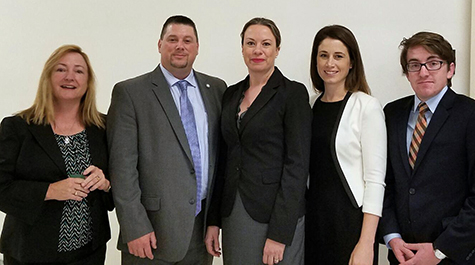Veterans Benefits Clinic Highlights Problem of Male Sexual Trauma in the Military
Members of William & Mary Law School’s Lewis B. Puller, Jr., Veterans Benefits Clinic traveled to Washington, D.C., on Sept. 21 to participate in a briefing and panel discussion on Male Sexual Trauma (MST) in the Military.
The event was hosted by The Military Sexual Assault Prevention Caucus, co-chaired by Congresswoman Niki Tsongas (D-MA) and Congressman Mike Turner (R-OH), at the Rayburn House Office Building.
Participants in the panel included:
- Diana Rangoussis, Senior Policy Advisor, Department of Defense Sexual Assault Prevention Response Office (SAPRO);
- Dr. Susan J. McCutcheon, Director of Family Services, Women’s Mental Health, and Military Sexual Trauma, Department of Veterans Affairs;
- Dr. Judith L. Johnson, Consulting Clinical Psychologist, The Lewis B. Puller, Jr. Veterans Benefits Clinic, William & Mary Law School;
- Brian Lewis, President and Co-Founder of Mr. MST;
- Heath Phillips, Executive Director of Mr. MST;
- Bob Hunter, Vice President of Mr. MST.
Discussion focused on the physical and mental trauma that male survivors of sexual assault experience, and the treatment and resources available.
“While MST has garnered a lot of attention in the media in recent years, the majority of attention has focused on women survivors,” said Elizabeth Tarloski, Visiting Professor of Practice at the Puller Clinic. “The absence of the male voice in this discussion only highlights the work that still needs to be done to provide appropriate individualized healthcare services to male survivors.”
The latest report from the Department of Defense’s Sexual Assault Prevention and Response Office (SAPRO) showed that a large number of men in the military are victims of sexual assault, and that men are less likely to come forward and report. The claim is supported by a March 2015 Government Accountability Office report that estimated at most only 13 percent of males reported their assaults, which is significantly lower than the percentage of females who report.
A major component of MST that differs from other types of trauma is that of potential consequences for one’s identity and full-time employment as an active duty service member.
“One who has been exposed to MST can justifiably be concerned about reporting of the event and the implications for one’s military career,” said Dr. Judith Johnson of the Puller Clinic. “Many military members dedicate their lives to the values of integrity and courage in service. The potential loss of occupation, coupled with betrayal of service values, can take a heavy toll on one’s sense of mission, identity, and work performance.”
The Military Sexual Assault Prevention Caucus is a bipartisan forum for all Members of Congress to learn about the problem, work with agencies to shape policy and create legislative solutions that improve Service member morale and welfare.
“Military sexual assault is a multifaceted challenge that no one piece of legislation can solve, and discussions such as the one held today provide invaluable information as we in Congress seek to address these crimes,” said Tsongas and Turner in joint press release. “We remain committed to ensuring our colleagues, the public and men and women in uniform are educated on this issue. By holding these briefings we can reach a larger audience and give a voice to the survivors of military sexual assault.”
The Lewis B. Puller, Jr., Veterans Benefits Clinic provides free legal representation to military veterans seeking disability benefits from the VA. Since its establishment in 2008 at William & Mary, the Puller Clinic has represented more than 150 veteran clients in hundreds of disability claims.
About William & Mary Law School
Thomas Jefferson founded William & Mary Law School in 1779 to train leaders for the new nation. Now in its third century, America's oldest law school continues its historic mission of educating citizen lawyers who are prepared both to lead and to serve.



